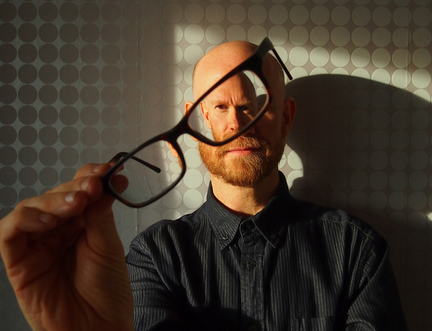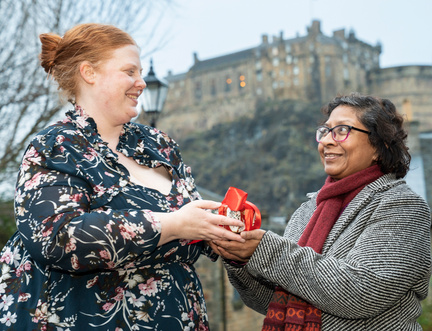Compassion for Strangers Will Save Us All
By David Leddy

In 2018, we commissioned 51 authors from 25 countries to write essays exploring ideas about freedom for The Freedom Papers, a publication produced in partnership with Gutter Magazine. Read on for David Leddy's essay, and visit guttermag.co.uk to purchase a copy of The Freedom Papers.
They say when trouble comes close ranks and so the white people did.
Where have I heard that before?
That’s the trouble with now,
the trouble with smartphones,
the trouble with cut
and especially paste.
It’s all been stolen from somewhere.
It’s all been taken out of context.
Jean Rhys was right, though.
Close ranks they did.
Remember that.
Remember when we thought technology would save us?
Remember when we thought the internet was a force for freedom?
But now Alexa’s directly connected to the police.
Now Grindr shares your HIV status
with Tom,
with Harry
and not just
Dick.
Now Facebook is livestreaming suicides.
We thought technology would make us equal, make us free.
Seems quaint now, doesn’t it?
Now that same technology’s looking
awfully like the opposite of freedom,
awfully like a stepping stone to genocide.
There are different types of freedom,
but the one I’m thinking of
is good, old-fashioned liberty.
Freedom from oppression or coercion,
the absence of immobilising conditions.
It’s a slippery notion, but a good place to start.
To find freedom from oppression
we need to find equality,
to find equality
we need to come together.
We can’t afford to set ourselves apart from other people,
from refugees in overloaded boats,
from gays in Chechen labour camps.
And I don’t mean this in an airy fairy, flaky, floaty kind of way.
Compassion can be hard work.
Feeling compassion for strangers
needs courage,
needs resolve,
needs faith in your own ability to love
even if you don’t get loved in return.
That’s fucking hard.
But what other choice do we have?
What’s the flip side of that coin?
All political oppression
relies on separation.
All political oppression
relies on decimating
the connection
between ourselves
and other people.
All political oppression
relies on loss of human connection.
We must resist that.
The first step towards civil war,
the first step towards genocide,
is creating an enemy,
is an insistence that
we have nothing in common
with those fuckers over there.
We must resist that.
We are in a global community now,
whether we like it or not.
Right or wrong,
this is the road
and we are on it.
We don’t have the option of feeling
contempt for strangers,
contempt for foreigners,
contempt for outsiders.
We must refuse to hate other people
and feel compassion for them instead.
But compassion is frightening.
It’s frightening because it shows us that the world’s not fair.
It’s easy to believe in meritocracy
because if you believe that
people get what they deserve
then you don’t need to feel bad
for the homeless people
because they deserve it.
You don’t need to feel bad for the refugees
because they just didn’t work hard enough.
You don’t need to feel bad for those gays
in those Chechen labour camps
because they should have
worked harder at
I dunno
not sucking cock?
So, when you open the door to compassion,
you open the door to the idea that
people don’t get what they deserve.
Miss Sharon Jones was right.
People don’t get what they deserve.
Remember that.
And that opens the door to the idea that maybe
you don’t deserve your lovely life,
or your semi-lovely life,
or your not-so-terrible life.
You don’t have this life because you deserve it,
you just have it because you have it.
You just have it by chance.
And those people with terrible lives,
their lives are terrible by chance too.
That’s a terrifying notion.
No wonder we’re all in denial about it.
So, I see why it’s easier for some people to believe in meritocracy,
because the alternative is terrifying.
It breaks your heart to see such suffering.
But see it you must.
Our favourite way to understand the world
is to arrange things into binaries.
Black and white.
Man and woman.
Left and right.
Right and wrong.
Them and us.
We don’t like a sliding scale.
We don’t like a continuum.
We prefer opposing sides.
It’s easy to feel compassion for people you already know.
It’s easy to feel compassion for people you already love.
But loving the ones on our side
makes it too easy
to hate the ones on the other,
and that’s a slippery slope.
At the end of the day,
genocide is less likely to happen
if we all resist thinking of
a them and an us,
a good and a bad.
Compassion for strangers
is at the root of all equality and
therefore the root of all freedom.
To achieve freedom, we must achieve equality.
To achieve equality we need to want to achieve equality,
we need to work to achieve equality
and some of us need to make small sacrifices to achieve equality.
Most of us, in fact, will need to make some small sacrifice somewhere along the line.
Most of us would give a kidney to our dying lover.
Many of us would give a kidney to a dying sister.
Far fewer would give a kidney to a dying friend.
Very few of us would give a kidney to a dying stranger.
Myself included.
And maybe that’s the root of the problem.
We need to treat strangers more like our family, less like our enemy.
Only then does it get easier
to make sacrifices for strangers,
to take risks for strangers,
to experience discomfort in order to help strangers.
Without that compassion we’ll never have
the enthusiasm to achieve equality.
Without equality we can’t achieve freedom.
At the end of the day,
in the thrill of the still of the dead of the night,
this is what I’m saying to you.
Compassion for strangers will save us all.
And you have to be prepared to die for it.
Otherwise what’s the point?
Not in a romantic way.
Not in a beautiful way.
You have to be prepared to die
in an ugly way,
an undignified way,
a possibly pointless,
probably unnoticed way.
Be prepared.
None of this is fiction.
Remember that.
Copyright © 2018, David Leddy. All rights reserved.
Supported by the Scottish Government’s Edinburgh Festivals Expo Fund through Creative Scotland.
Look, Listen & Read
- 2025 Festival:
- 9-24 August
Latest News
 Communities Programme participants celebrate success of 2024
Communities Programme participants celebrate success of 2024




